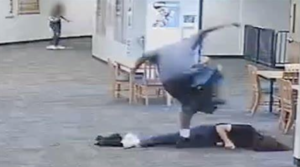
by James C. Sherlock
In 2019, the National Education Association (NEA) published Threatened and Attacked By Students: When Work Hurts, urging lawmakers to address the crisis of unsafe behaviors in schools.
Read about Chesterfield schools in that article.
Unfazed, progressives in 2020 in full control of the General Assembly, led by now-Congresswoman-elect Jennifer McClellan, looked to break what they considered a “school-to-prison pipeline.”
They changed Virginia law to eliminate the requirement for principals to report misdemeanor assault and battery in Virginia schools, on school buses or at school-sponsored events to law enforcement.
Even battery on school staff.
It would seem to me, if I worked in a school, useful to require such violence to be reported to law enforcement.
But maybe that’s just me.
Change in Virginia law. Until 2020, Virginia school principals were required to report all crimes occurring on school property, on buses or at school-sponsored events to law enforcement.
Very straightforward.
Not any more.
See the 2020 change below to § 22.1-279.3:1. Reports of certain acts to school authorities; reports of certain acts by school authorities to parents; reports of certain acts by school authorities to law enforcement.
D. Except as may otherwise be required by federal law, regulation, or jurisprudence, the principal shall immediately report to the local law-enforcement agency any act enumerated in clauses (ii) through (vii) of subsection A that may constitute a
criminalfelony offense and may report to the local law-enforcement agency any incident describedin clause (i)ofsubsection A.
So, principals now must assume the role of both judge and jury and determine whether the assault and battery is a Class 1 misdemeanor or, based on either intent or extent of injuries, a felony.
Really.
Misdemeanor assault and battery. Assault and battery are not defined in Virginia law, just the penalties.
Battery as generally defined in common law can be harmful or offensive.
A harmful contact of battery is contact causing physical impairment or injury, while an offensive contact of battery is a contact that makes a reasonable person of ordinary sensibilities feel threatened.
Code of Virginia § 18.2-57. Assault and battery; penalty.
A. Any person who commits a simple assault or assault and battery is guilty of a Class 1 misdemeanor.
D. In addition, if any person commits a battery against another knowing or having reason to know that such other person is a full-time or part-time employee of any public or private elementary or secondary school and is engaged in the performance of his duties as such, he is guilty of a Class 1 misdemeanor
So, a principal is no longer required to report to law enforcement misdemeanor assault and battery not only against students, but also against teachers and staff.
Even if bodily injury occurs.
Unless he judges it to be a felony.
Felony assault and battery. There are two situations that require reporting to police because the battery rises to the level of a felony.
- If under § 18.2-57 B. the principal discerns the battery occurred with intent to injure a person because he/she is a member of a listed protected class; or
- if the battery results in a “serious bodily injury.”
Serious bodily injury is defined in § 18.2-51.4. Maiming, etc., of another resulting from driving while intoxicated and referred to for definition purposes in other statutes such as § 18.2-58. Robbery; penalties.
“serious bodily injury” means bodily injury that involves substantial risk of death, extreme physical pain, protracted and obvious disfigurement, or protracted loss or impairment of the function of a bodily member, organ, or mental faculty.
“Maiming” cross-references to “serious bodily injury” in that and other Virginia laws.
As an aside, one wonders if the “serious bodily injury” assessment is to be made by the school nurse who may or may not be certified in trauma. Because if 911 is called to assess, treat and/or transport the injured party, police as well as EMS will show up.
Got all that?
You are now qualified to be a principal in a Virginia public school or a juvenile and domestic relations court judge.
Change the law. The Democratic General Assembly made the law change purposely to hide from law enforcement assault and battery in schools.
It puts pressure on the principals not to report. And they are the ones who have to face the parents.
It was signed into law by a Ralph Northam damaged and submissive after the blackface scandal that broke on Feb. 1, 2019.
Simply said, the law as written is on its face unacceptably dangerous for students and staff.
It needs to be changed to list battery as an offense that must be reported to law enforcement regardless of the level of injuries sustained.
Or Virginia will continue by law to enable school violence.
School boards. Importantly, I find no restrictions in law that prohibit school boards by policy from requiring principals to report all incidents of battery to law enforcement.
Maybe even report a six-year-old who, say, strangles a teacher. So, maybe he does not come back another day and shoot one.
Perhaps they can prevent a student like the one in the picture, who has grown to NFL size, from learning early in Virginia that violence in school can be expunged in a restorative justice circle.

Leave a Reply
You must be logged in to post a comment.